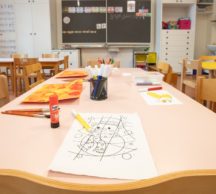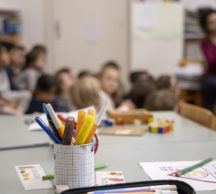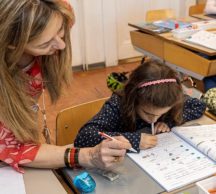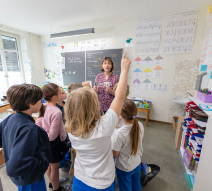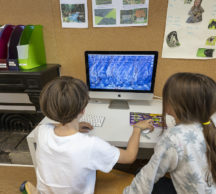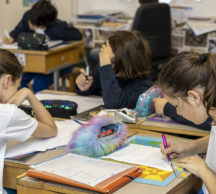Seventh-year primary class
The program in detail
- Reading
- Writing
- Diction and memorising
- Spelling
- Conjugation
- Grammar
- Vocabulary
- Geography
- History
- Mathematics - Numbers
- Space
- English
- German
- Science
- Arts
- Sports
- Religious education
Reading
- Supervised reading of books presenting complete stories
- Spoken reading of a wide range of texts with explanations
- Silent reading guided by written questions
- Book presentations given by pupils
Writing
- Writing varied texts (range of literary genres) using reference documents
- Writing structured texts based on a model
- Poetry
Diction and memorising
- Classic and modern poems, theatrical works
- Spoken presentations
Spelling
- Dictation, mainly unprepared, with explanatory corrections
- Studying essential spelling rules
- Varied spelling exercises
Conjugation
- All simple tenses of the indicative, as well as the perfect tense, present conditional and present imperative
Grammar
Recognising the nature of words
- Nouns and noun groups
- Determiners: articles and possessive, demonstrative, numeral and prepositional determiners, and others
- Adjectives and adjectival groups
- Verbs
- Personal pronouns
- Prepositions and prepositional groups
- Adverbs
Recognising how words or word groups work
- Subjects
- Verb groups including verb complements
- Sentence complements with places and time
Vocabulary
- Weekly words
- Widening semantic vocabulary
Geography
- Identifying relations between human activities and how space is organised
- Topics covered: home environment and leisure
History
- Identifying how humankind has organised its collective life through the ages
- Period of history: The Middle Ages (5th-14th centuries)
Mathematics - Numbers
- Natural numbers and operations
- Understanding rational numbers
- Multiples and divisors
- Operations with rational numbers
- Divisions with natural numbers
- Applications
- Powers
Space
- Finding locations on a plane
- Measuring lengths
- Isometry
- Surfaces and solids
- Measuring areas
- Problem-solving for learning how to reason, for understanding a number and giving it value, for using the four operations’ properties, for exploring and organising space, for understanding geometric figures and transformations on a plane, and for measuring
Two weekly workshops in mathematical reasoning with help from a student from the EPFL school of technology in Lausanne.
English
- Level 4 of the ‘Kid’s Box’ method. Preparing for the Cambridge ‘Young Learners Movers Test’ (listening test, reading and writing test, and speaking test)
- Individualised programme for English-speaking pupils based on the ‘Nelson English’ course
Lessons are given in half-groups by a specialist teacher who is a native English-speaker.
One-week stay in England every other year
German
- Using the method ‘Junior – Deutsch für die Romandie – 7. Klasse’ with online learning resource
- Deepening understanding of basic grammatical rules and widening vocabulary
- Topics covered: days of the week, months, time, food, shops, school festival and an annual topic chosen by the school
Lessons are given in half-groups by a specialist teacher who is a native German-speaker
One-week stay in Germany every other year
Science
- Natural and technical phenomena
- Diversity of the living world
- Human body
- Annual topic chosen by the school
Arts
- Cultivating an appreciation of artistic activities, stimulating pupils’ creativity and imagination
- Trying out a wide range of techniques: drawing, painting, collage, cutting up, putting together, printing techniques, modelling, etc.
- Using a wide range of materials: paper, cardboard, soil, fabrics, plaster, natural material, etc.
- Introducing art: studying culture by associating names, works of artists, styles and readings
- Making objects and gifts for different events (Christmas, Mother’s Day, etc.).
Artistic activities are taught for half of the year in French and the other half of the year in English by a native English-speaker so that pupils can put into practice points learned in lessons in a less formal setting
Sports
- Individual and collective games (techniques and tactics)
- Sporting exercises: motor-skills activities, running, jumping, throwing, etc.
- Health and physical condition: warming up, getting muscles ready
- Interpersonal skills: teamwork, pleasure, bravery, sportsmanship, respect for opponents, etc.
Religious education
- Comparative study of the world’s major religions
Toutes les informations pour procéder aux démarches d’admission sont disponibles en ligne :
Admissions